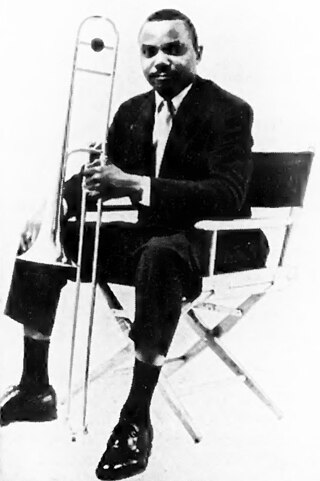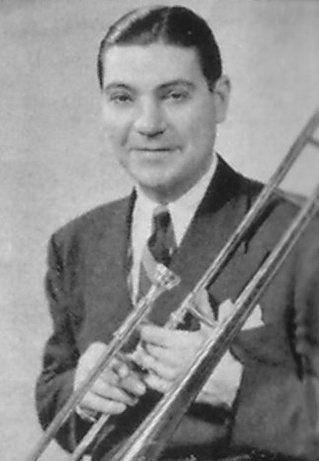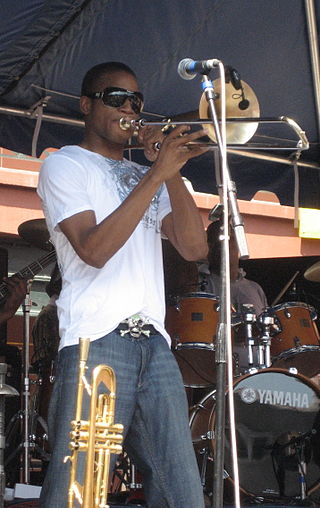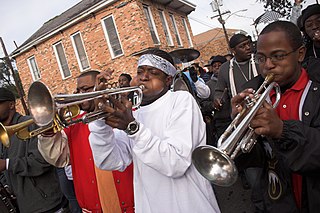
Joseph Nathan "King" Oliver was an American jazz cornet player and bandleader. He was particularly recognized for his playing style and his pioneering use of mutes in jazz. Also a notable composer, he wrote many tunes still played today, including "Dippermouth Blues", "Sweet Like This", "Canal Street Blues", and "Doctor Jazz". He was the mentor and teacher of Louis Armstrong. His influence was such that Armstrong claimed, "if it had not been for Joe Oliver, Jazz would not be what it is today."

A jazz band is a musical ensemble that plays jazz music. Jazz bands vary in the quantity of its members and the style of jazz that they play but it is common to find a jazz band made up of a rhythm section and a horn section.

Edward "Kid" Ory was an American jazz composer, trombonist and bandleader. One of the early users of the glissando technique, he helped establish it as a central element of New Orleans jazz.

J. J. Johnson, born James Louis Johnson and also known as Jay Jay Johnson, was an American jazz trombonist, composer and arranger.

Weldon Leo "Jack" Teagarden was an American jazz trombonist and singer. According to critic Scott Yanow of Allmusic, Teagarden was the preeminent American jazz trombone player before the bebop era of the 1940s and "one of the best jazz singers too". Teagarden's early career was as a sideman with the likes of Paul Whiteman and lifelong friend Louis Armstrong.

Tom P. Brown, sometimes known by the nickname Red Brown, was an American dixieland jazz trombonist. He also played string bass professionally.

The Preservation Hall Jazz Band is a New Orleans jazz band founded in New Orleans by tuba player Allan Jaffe in the early 1960s. The band derives its name from Preservation Hall in the French Quarter. In 2005, the Hall's doors were closed for a period of time due to Hurricane Katrina, but the band continued to tour.

The Rebirth Brass Band is a New Orleans brass band. The group was founded in 1983 by Phillip "Tuba Phil" Frazier, his brother Keith Frazier, Kermit Ruffins, and classmates from Joseph S. Clark Senior High School, which closed in the spring of 2018, in the Tremé neighborhood of New Orleans. Arhoolie released its first album in 1984.

Percy Gaston Humphrey was an American jazz trumpeter and bandleader in New Orleans, Louisiana.

William Russell Watrous III was an American jazz trombonist. He is perhaps best known for his rendition of Sammy Nestico's arrangement of the Johnny Mandel ballad "A Time for Love", which he recorded on a 1993 album of the same name. A self-described "bop-oriented" player, he was well known among trombonists as a master technician and for his mellifluous sound.

Troy Andrews, also known by the stage name Trombone Shorty, is a musician, most notably a trombone player, from New Orleans, Louisiana. His music fuses rock, pop, jazz, funk, and hip hop.

The music of New Orleans assumes various styles of music which have often borrowed from earlier traditions. New Orleans, Louisiana, is especially known for its strong association with jazz music, universally considered to be the birthplace of the genre. The earliest form was dixieland, which has sometimes been called traditional jazz, 'New Orleans', and 'New Orleans jazz'. However, the tradition of jazz in New Orleans has taken on various forms that have either branched out from original dixieland or taken entirely different paths altogether. New Orleans has also been a prominent center of funk, home to some of the earliest funk bands such as The Meters.

The Olympia Brass Band is an American jazz brass band from New Orleans.

Louis Albert Cottrell Jr. was a Louisiana Creole jazz clarinetist and tenor saxophonist. He was the son of the influential drummer Louis Cottrell, Sr., and grandfather of New Orleans jazz drummer Louis Cottrell III. As leader of the Heritage Hall Jazz Band, he performed at Carnegie Hall in 1974.
Dixieland jazz, also referred to as traditional jazz, hot jazz, or simply Dixieland, is a style of jazz based on the music that developed in New Orleans at the start of the 20th century. The 1917 recordings by the Original Dixieland Jass Band fostered awareness of this new style of music.

Wendell Eugene was an American jazz musician from New Orleans, Louisiana. He was a popular trombonist on the New Orleans jazz scene and recorded with artists such as Lionel Ferbos, Harold Dejan, and Kermit Ruffins. He was for a time the oldest active jazz musician in New Orleans.

The trombone is a musical instrument from the brass instrument family. Trombone's first premiere in jazz was with Dixieland jazz as a supporting role within the Dixie Group. This role later grew into the spotlight as players such as J.J. Johnson and Jack Teagarden began to experiment more with the instrument, finding that it can fill in roles along with the saxophone and trumpet in bebop. The trombone has since grown to be featured in standard big band group setups with 3 to 5 trombones depending on the arrangement. A person who plays the trombone is called a trombone player or a trombonist.

Calvin A. Johnson Jr. is an American saxophonist, bandleader, composer, producer, and actor from New Orleans, Louisiana. A multi-instrumentalist, he is best known as a tenor and soprano saxophone player but also performs and records on alto and baritone saxophones, clarinet, and flute. He has worked with many of the biggest names in New Orleans music, including Aaron Neville, Harry Connick Jr., the Dirty Dozen Brass Band, Mystikal, Irvin Mayfield, Mannie Fresh, and others. Johnson is the nephew of New Orleans clarinetist Ralph Johnson, a longtime member of the Preservation Hall Jazz Band. He began playing saxophone at the age of seven, and since 2008 has been playing with his own band, Calvin Johnson & Native Son.

James Brown Humphrey, also known as "Professor Jim" Humphrey (1859–1937) was an American classical musician, dance band leader, and music instructor in New Orleans, Louisiana, and central figure in the formation of jazz as a contemporary musical art form. Humphrey predates the jazz genre as an active performer and is not himself considered a jazz musician. However, his involvement in the formal training of large numbers of musicians along the southern plantation belt of the Mississippi River delta during the immediate years following the reconstruction era resulted in many virtuoso performers who would go on to originate jazz as a distinct musical genre. Consequently, he is regarded by some in the jazz aficionado community to be "the grandfather of jazz".

Dave Albert Williams Jr. was an American jazz, blues, and rhythm & blues pianist, bandleader, singer, and songwriter. He was the author of "I Ate Up The Apple Tree", a staple of contemporary New Orleans brass bands. His career as a working musician spanned five decades.



















